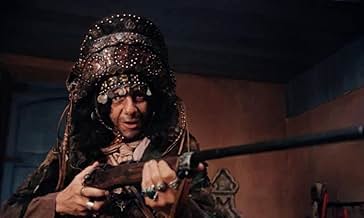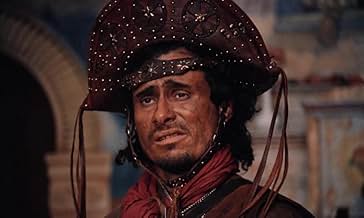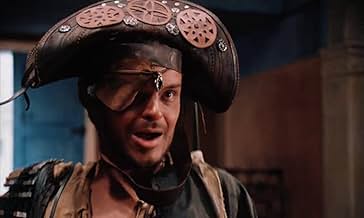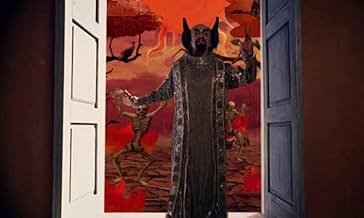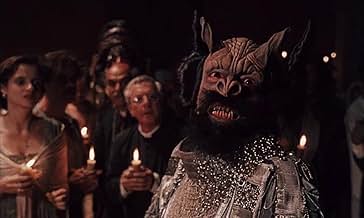O Auto da Compadecida
- 2000
- 1 Std. 44 Min.
IMDb-BEWERTUNG
8,6/10
20.427
IHRE BEWERTUNG
Füge eine Handlung in deiner Sprache hinzuThe lively João Grilo and the sly Chicó are poor guys living in the hinterland who cheat a bunch of people to survive, but their plans are halted when a bandit comes to town.The lively João Grilo and the sly Chicó are poor guys living in the hinterland who cheat a bunch of people to survive, but their plans are halted when a bandit comes to town.The lively João Grilo and the sly Chicó are poor guys living in the hinterland who cheat a bunch of people to survive, but their plans are halted when a bandit comes to town.
- Auszeichnungen
- 10 Gewinne & 10 Nominierungen insgesamt
Empfohlene Bewertungen
O Auto de Compadecida is a funny film, in more ways than one. At first, I was baffled by the storyline, or rather, by the lack of a storyline such as I'm used to. If you expect the first five or ten minutes of a film being devoted to introducing the characters, their backgrounds, and their passions, you'll find yourself puzzled by this flick. There is hardly any introduction or explanation, and such as is offered appears exactly at the appropriate moments. The film is also funny in content. The main characters are a teller of unlikely stories and a schemer of impossible schemes, who never reach the third dimension, but then, there's no need for that: the burlesque quality and speed of the scenes thrive on these two men being cartoon characters rather than real people. And truly, an in-depth character would be highly out of place in a scene which involves Jesus, Mary, and Lucifer doodling in the margins of a book--using blood as ink, naturally. Highly enjoyable.
It's hard to find actors with as much charisma and on-screen chemistry as this movie's main duo. Throw in an impeccable script and various Cameos by Brazil's biggest and brightest stars, and you'll have one of the funniest movies ever made (and my personal favorite amongst the post-1980s Brazilian productions. The only downside of this movie is that it was originally a four-hour TV mini-series; the two-hour version is inevitably condensed. If you have the option of choosing between them, go for the complete work. If not... well, half the laugh is still better than no laugh.
"O Auto da Compadecida," commonly translated as "A Dog's Will" (a translation which, to my ears, waters down the significance, the gravitas, and the poetry of the title in the original) is a sure-classic and a phenomenon of the Brazilian cinema and popular culture of the recent past and of modernity in the rural communities of its countryside. The film has marked the heart and the soul of an entire generation since the dawn of the twenty-first century, and features lines and words still common-parlance among the average Brazilian (e.g., João Grilo's : "Não sei não... Só sei que foi assim. ("I don't know--all I know it was so"))
All in all, the film portrays themes of class, spiritual feelings, and some legendary figures of the folklore and of the past of the Brazilian drylands and Northeast. In a way, "O Auto da Compadecida" memorializes through the friendship of Chicó and João Grilo an entire generation and past, an entire dialectic and language, all done with outstanding actors, actresses, and acting overall.
This is surely a landmark of Brazilian cinema, imagination, and one that is sure to delight those open to receive its humor and themes of love, spirituality, redemption, and forgiveness.
All in all, the film portrays themes of class, spiritual feelings, and some legendary figures of the folklore and of the past of the Brazilian drylands and Northeast. In a way, "O Auto da Compadecida" memorializes through the friendship of Chicó and João Grilo an entire generation and past, an entire dialectic and language, all done with outstanding actors, actresses, and acting overall.
This is surely a landmark of Brazilian cinema, imagination, and one that is sure to delight those open to receive its humor and themes of love, spirituality, redemption, and forgiveness.
One of my favorite Brazilian movies. Matheus Nachtergaele and Selton Mello did a terrific job together. The movie is funny, colorful, engaging and has a little bit of culture from the northeast of Brazil. Definitely a must watch movie.
When the 4-chapter mini-series was announced by Globo network, few people expected it to be THAT good, for the simple reason that nothing that good had been done in Brazilian television in the previous 15 years. The adaptation is efficient, departing very little from Cabral de Mello Neto's text and mood, the direction, scenography and art direction are beautiful, the humour is well balanced with adventure and drama, everything works well. But the real treat you get watching this is Nachtergale's performance as Joao Grilo. This is the production that made everyone agree that he is the best actor of his generation by a mile. Let me talk a little of what the story is about. It is not really a 'fantasy' of the writer as some American viewers (understandably) thought. The play's proposal is to be an adaptation of several texts from the tradition of 'cordel literature', typical of the Brazilian northeast (where the play is set). Those texts are mostly long poems that translate the folklore of that region. It is, of course, a very catholic area, but in a very peculiar way. Jesus ('Manuel'), Mary ('the Merciful') and the devil ARE common characters of those folk stories, and they are as 'accessibile' to people as the movie shows in Brazilian Folklore. Also from 'Cordel literature' comes the character of 'Joao Grilo'. Anyone who sees this movie and don't know Grilo should watch for Shakespeare's 'Henry IV' (the character Falstaff) and Moliere's 'Scapino'. It is sort of a universal character the court's fool, and doesn't belong to Arraes, Mello Neto or even to Brazilian Folklore. So it is not really someone's fantasy it is the fantasy of an anonymous collective, the people from Brazil's northeastern 'sertao'. It is a great movie anyway, I just thought people would like to know the background.
Wusstest du schon
- WissenswertesThis is the third adaptation of Ariano Suassuna's "O Auto da Compadecida".
- VerbindungenEdited from O Auto da Compadecida (1999)
- SoundtracksCaboclos de Orubá
Written by Sá Grama
Performed by Sérgio Campelo, Gilberto Campello, Jônatas Zacarias, Antônio Barreto,
Frederica Burgeois, Cláudio Moura, Fábio Delicato, Neide Alves and Thiago Fournier
Arranged and Produced by Sá Grama
Top-Auswahl
Melde dich zum Bewerten an und greife auf die Watchlist für personalisierte Empfehlungen zu.
- How long is A Dog's Will?Powered by Alexa
Details
Box Office
- Weltweiter Bruttoertrag
- 6.281.890 $
- Laufzeit1 Stunde 44 Minuten
- Farbe
- Sound-Mix
- Seitenverhältnis
- 1.66 : 1
Zu dieser Seite beitragen
Bearbeitung vorschlagen oder fehlenden Inhalt hinzufügen



